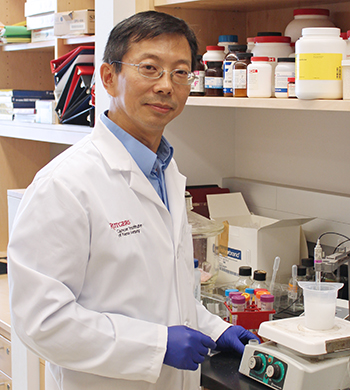 New Brunswick, N.J. – Research by Rutgers Cancer Institute of New Jersey investigators has identified novel functions of the superoxide dismutase 1 (SOD1) enzyme providing support that it could serve as a therapeutic target in the most common type of lung cancer. Results of the work are being presented as part of a poster session at the American Association for Cancer Research Annual Meeting being held later this week in Chicago.
New Brunswick, N.J. – Research by Rutgers Cancer Institute of New Jersey investigators has identified novel functions of the superoxide dismutase 1 (SOD1) enzyme providing support that it could serve as a therapeutic target in the most common type of lung cancer. Results of the work are being presented as part of a poster session at the American Association for Cancer Research Annual Meeting being held later this week in Chicago.
Lung cancer is the second-most diagnosed cancer and second-most cause of cancer death in the U.S. for both men and women, according to the American Cancer Society. Non-small cell lung cancer (NSCLC) is the most common type (84 percent). The five-year relative survival rate for lung cancer is 18 percent. The laboratory of X.F. Steven Zheng, PhD, co-director of the Cancer Pharmacology Program at Rutgers Cancer Institute, has studied associations between NSCLC and the SOD1 enzyme.
SOD1 is an enzyme that removes a specific radical byproduct created during the energy-producing process of cell metabolism. This ‘superoxide’ byproduct comes from a family of byproducts known as reactive oxygen species (ROS). These byproducts can modify fats, proteins and DNA in a chemical reaction called oxidation, causing these biological molecules to lose functions. Low levels of these byproducts can cause normal cells to become cancerous. At higher levels, cell death and damage to tissues and organs can occur. Recent work by the Zheng laboratory demonstrated the novel function of SOD1 as a transcription factor that helps remove ROS byproducts, thus regulating cell response to oxidative stress.
In this current work, Zheng and colleagues used lung cancer laboratory models in which the SOD1 enzyme was genetically removed. With the absence of SOD1, investigators found the tumor burden to be reduced, thus suggesting SOD1 is required for tumor maintenance and survival. Also, using tumor-derived primary cancer cells from laboratory models, researchers show that SOD1 is critical for NSCLC cell proliferation and survival.
“The novel functions of SOD1 identified through our study are of biological and translational significance and provide further support for SOD1 as a promising therapeutic target for non-small cell lung cancer,” notes Zheng, who is the senior investigator of the work and also a university professor at Rutgers Robert Wood Johnson Medical School. “Identifying and studying new drug targets are important for improving lung cancer survival.”
Along with Zheng, the author team consists of Xiaowen Wang, Rutgers University School of Graduate Studies Biomedical Sciences; Justin Wong, Rutgers University School of Arts and Sciences; Holly Van Remmen, Oklahoma Medical Research Foundation; Jessie Yanxiang Guo, Rutgers Cancer Institute of New Jersey and Rutgers Robert Wood Johnson Medical School; and Eileen White, Rutgers Cancer Institute of New Jersey and Rutgers University School of Arts and Sciences.
The study was supported by grants from the National Institutes of Health/National Cancer Institute (R01CA173519, R01CA166575 and R01CA123391).
About Rutgers Cancer Institute of New Jersey
Rutgers Cancer Institute, along with its partner RWJBarnabas Health, offers the most advanced cancer treatment options including clinical trials and novel therapeutics such as precision medicine and immunotherapy – many of which are not available at other facilities across the state. Patients have access to these cutting-edge therapies throughout the state at Rutgers Cancer Institute of New Jersey in New Brunswick, Rutgers Cancer Institute of New Jersey at University Hospital in Newark, as well as at RWJBarnabas Health.
Along with world-class treatment, which is often fueled by on-site research conducted in Rutgers Cancer Institute laboratories, patients and their families also can seek cancer preventative services and education resources throughout the Rutgers Cancer Institute and RWJBarnabas Health footprint statewide. To make a tax-deductible gift to support the Cancer Institute of New Jersey, call 848-932-8013 or visit www.cinj.org/giving. Follow us on Facebook at www.facebook.com/TheCINJ.
For journalists – contact:
Michele Fisher
Media Relations Specialist
732-235-9872
michele.fisher@rutgers.edu
For patient appointments/inquiries please call 732-235-8515.

